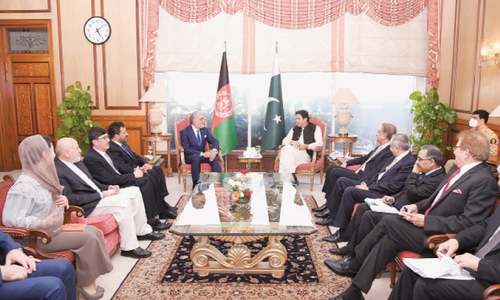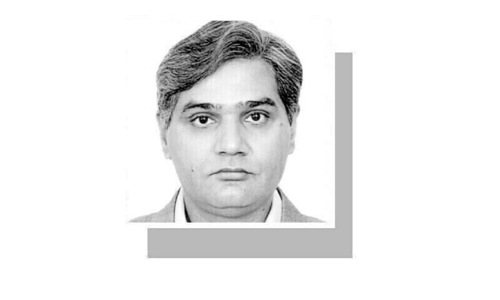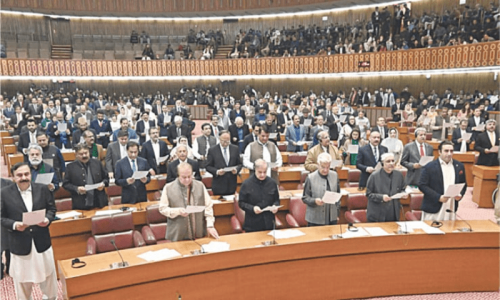ISLAMABAD: Afghan peacemaker Abdullah Abdullah has said that Pakistan is “on the same page” as Afghanistan in relation to the need for reduction in violence and flexibility in Doha intra-Afghan negotiations by Taliban.
In an interview on Wednesday, hours before returning to Kabul after completing his three-day visit to Pakistan, the chairman of High Council for National Reconciliation in Afghanistan, said: “We had good discussions, extensive discussions with authorities, civilian and military, and in most of the case for example on the need for reduction in violence, the need for getting to ceasefire, on the need for showing flexibility … we are on the same page.”
But, he wants these demands to be strongly emphasised in “messages communicated to Taliban”, who are currently participating in intra-Afghan dialogue in Doha.
Mr Abdullah’s visit, his first to Pakistan in his new role, was meant to seek Pakistan’s cooperation for what he had said in his speech at the Institute of Strategic Studies, Islamabad “to see the process through to the next stage”.
Says ground prepared for turning page in bilateral ties
For that to happen an equal emphasis was placed by both sides on exploring the possibilities for improving Pak–Afghan bilateral ties that had been marred by mistrust and acrimony for a long time.
Both sides, by the end of the visit, suggested that ground had been prepared for turning the page in bilateral relations.
“Enjoyed meeting Dr Abdullah Abdullah, Chairman HCNR of Afghanistan. We had a very interesting conversation: theme being the past is an invaluable teacher to learn from but not to live in. We must look forward towards the future. I wish him all the success in his mission,” Prime Minister Imran Khan tweeted almost as the Afghan official was on his way to the airport to take his return flight.
Mr Abdullah retweeted Mr Khan’s tweet and in a separate tweet thanked Pakistani leaders for “their warm welcome, hospitality and a new path”.
In his interview, he said his top priority for negotiations is achieving greater “security for citizens”. Those negotiating on behalf of the Afghan government, he said, know that “this is the priority for the people”.
An uptick in violence has been noticeable since the start of the dialogue in Doha on Sept 12. Both sides blame each other for ramping up violence.
Increased violence can potentially cause a setback to the nascent dialogue.
Kabul has been demanding a ceasefire from the outset of the Doha talks, but the Taliban do not agree with it and are linking any lowering of violence to progress in the peace process towards a settlement.
President Ashraf Ghani in his speech to the UNGA last week said: “The Afghan people have a clear and urgent priority: a ceasefire. An urgent end to the violence will more than anything else give us a chance to progress.”
Pakistan has over the past few weeks repeatedly called on all Afghan sides to lower violence, but Foreign Minister Shah Mahmood Qureshi, during Mr Abdullah’s visit, was more emphatic about the issue, saying it was a “pre-requisite for peace”.
Mr Abdullah, in his interview, while emphasising the need for immediate reduction in violence, said: “That is the only way forward in order to maintain the momentum behind the process and in support of the process”.
The peace official appeared hopeful about the dialogue delivering peace, but was clearly dissatisfied at the pace at which it was proceeding.
“I consider it as a real chance for peace,” he said, adding, “but if you were to ask me if I’m happy with the current pace of progress, absolutely not. Is that sufficient? Absolutely not. We need to move forward”.
The talks in Doha have been continuing for three weeks now, but the two sides are yet to settle on the principles governing their dialogue. They will subsequently commence discussions on the agenda for their negotiations.
Asked if he had any timeframe in mind for reaching a negotiated settlement, he said: “The sooner the better, but it will depend on the will and intentions of the two sides.”
“The need not to waste time and miss further opportunities could not be more urgent than its today,” he added.
Mr Abdullah has, however, noticed some flexibility in Taliban negotiators in Doha, even though on issues other than reduction in violence. He said there were 21 issues on the table in the talks on the principles of the negotiations and he was not “completely disappointed” about the progress on them.
One of the sticking points on which the two sides have made some progress is the adoption of Hanafi Sunni Islamic law principles. “To a large extent there is an understanding, which addresses Taliban demand and concerns of Shia Muslims and other religious minorities,” Mr Abdullah disclosed.
There are, however, other areas where the gulf is too wide to be bridged soon. This includes women’s rights and freedom of expression. “These are not reversible. People have made sacrifices for them,” he said.
He said the way forward on these issues is not imposing our views on each other, but finding ways for peacefully coexisting in society while contesting ideas through non-violent means.
Mr Abdullah said government negotiators, meanwhile, have been “clearly instructed to be flexible and patient, and to use patience throughout”.
In reply to a question about withdrawal of US forces from Afghanistan, the Afghan official agreed with Pakistan and some other countries that had been cautioning against a precipitous pullout.
“There are other conditions attached with US withdrawal from Afghanistan, which are related to Al Qaeda.… There is a commitment made by Taliban in their agreement with US. The implementation of that condition is also important,” he emphasised.
Published in Dawn, October 2nd, 2020

















































